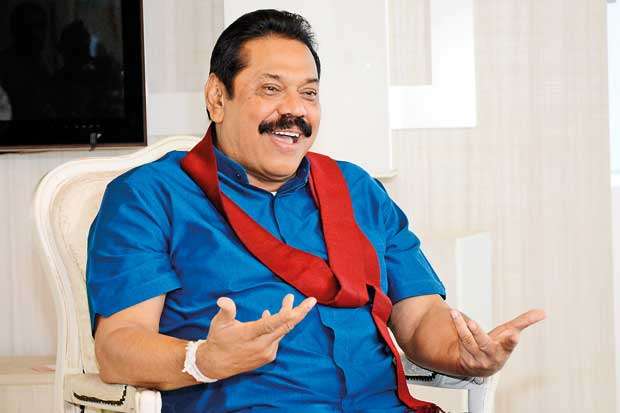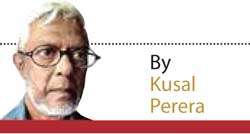Reply To:
Name - Reply Comment

Sughandika Fernando exposed the whole justice system
Where the Courts of Law cannot deliver justice, no repairs or reforms were possible
There are thus definite and serious doubts about the role of the Judiciary and its independence
This unprincipled Unity Government cannot provide answers to issues the people need answers
 A fortnight ago a video clip went viral on social media that left the whole of the Judiciary, the prosecuting agencies and the legal profession stark naked.
A fortnight ago a video clip went viral on social media that left the whole of the Judiciary, the prosecuting agencies and the legal profession stark naked.
It was a personal narrative by a young female lawyer, Sughandika Fernando that exposed the whole justice system from top to bottom, with names, dates and places and her own involvement in each of the cases and incidents she mentioned.
She alleged the Courts from Magistrate to Supreme Court, the Bar Association of Sri Lanka, the local Bar Associations, senior lawyers, the Attorney General’s Department, the Police Department including its top officials and the politicians, as wholly corrupt, working together hand-in-glove to undermine Justice and fair play.
Most, unfortunately, the mainstream media does not think Ms Fernando’s personal stories are worth further discourse in terms of justice and in relation to judicial independence.
In any country, where the Courts of Law cannot deliver justice, no repairs or reforms are possible.
This exposure tells us just that.
It is not the Judiciary alone that is tied in this nauseating chaos. Everything from professional ethics, politics to economy is in it.
As a profession, lawyers don’t represent the interests of their clients. Obvious it is with suspects left in remand custody for years, not weeks.
Apprentices exploited to no end and junior female lawyers sexually abused too.
Her detailed exposure tells the Police and the legal profession play together for their own interests.
The Court Mudliyars also interfere in deciding dates and even rulings through various manipulations. Citing a case in which she appeared, she even named the then Deputy Solicitor General as manipulating cases of political interests through interpretations.
On her experience, independence in appearing for clients at times, bring numerous threats to lawyers.
Though most of Ms Fernando’s tales are limited to her experience in Chilaw and the Gampaha District, they cannot be mere provincial distortions or a local sickness that can be cured on an issue basis.
They are tied in numerous ways to Colombo and the apex bodies of the Judiciary.
While media reports said President Sirisena was against the arrest of Gotabhaya Rajapaksa, the FR petition was re-fixed for hearing twice before allowing him to stay free with an interim stay order on his arrest for almost one year
All issues highlighted put together, Ms Fernendo’s exposure basically says, the judicial system as a whole from investigations through prosecution, is corrupt to the core and is politicised beyond repair.
We, therefore, have to accept, this Judiciary with all its line departments and the private bar, does not necessarily decide independently and is often partisan, due to politics and corruption at all levels.
There is no other way to explain the status of the Judiciary, given the fate of the three million US dollar Forex case, in which Ravi Karunanayake was indicted with two others and the case dragged on for six years from 2009 till a change of Government.
In 2015 May Karunanayake was cleared on technical grounds allowing the Attorney General to file papers with due amendments that during the past three years have not been attended to.
There is also no other way of explaining how Gotabhaya Rajapaksa can avoid arrest with an FR petition filed with the Supreme Court in May 2017 to date.
While media reports said President Sirisena was against the arrest of Gotabhaya Rajapaksa, the FR petition was re-fixed for hearing twice before allowing him to stay free with an interim stay order on his arrest for almost one year and still pending.
There is also no other explanation possible for unbelievably long detentions of Tamil youth without any charges, after many years of investigations by the TID and the CID.
Looking back, three Chief Justices of the Supreme Court, Sarath N. Silva CJ, Shiranee Bandaranayake CJ and Mohan Peiris CJ, are of very questionable track records.
Sarath N. Silva on his own accord accepted his ruling on Helping Hambantota case that was politically very sensitive, went against the people and made a public apology on it.
Shiranee Bandaranayake allowing President Rajapaksa to amend the Constitution to have an unrestricted number of terms under the 18 Amendment without a Referendum smack of political patronage.
She as CJ was in a conflict of interest with her husband holding a political appointment by President Rajapaksa.
There isn’t much to say about Mohan Pieris as CJ, who was a direct political appointment by President Rajapaksa.
There are thus definite and serious doubts about the role of the Judiciary and its independence.
Even after this Yahapalanaya Government was installed, nothing systemic has changed, with a heavily politicised Constitutional Council (CC) nominating for appointments.
The CC constituted with seven Members of the present Parliament and three members called “civil society” representatives have been held responsible for partiality and bias in nominating Members to “Independent” Commissions, most of which are dysfunctional and ineffective.
The three civil society representatives are not seen playing any role in the CC.
There is no transparency in CC activities and no minutes of meetings in public domain. Nor do these three civil society representatives say, what they do and where they stood in nominating individuals to very important positions and Commissions.
In fact, the CC can meet without them, with the seven Parliamentary Members completing the quorum necessary. There is no reason, therefore, to expect the CC to function ethically, honestly and impartially.
Add these negatives to all that Ms Fernando said and the cumulative effect cannot leave any space for independence and fair play in our judicial system.
We are thus compelled to accept the co-sponsored UNHRC Resolution adopted at the 2015 September-October Sessions in Geneva was absolutely right. This Judiciary with untrustworthy and undependable investigating and prosecuting agencies in a Sinhala dominated and polarised society cannot be expected to act independently and in fairness to victims of other ethnic and religious denominations.
If as Ms. Fernando kept saying and convincingly too, while investigations, interpretations, productions in Courts, fixing dates, suppressing evidence are all possible for the powerful, the rich and the corrupt, the likes of Jeyakumari Balendrans protesting in Vavuniya, Kilinochchi, Mullaithivu and Trincomalee, demanding answers for their missing family members at the hands of security forces, would hardly have space for justice.
More because this Yahapalana Government as often proved, is awfully biased towards Sinhala Buddhist sentiments and demands.
The Judiciary, after all, is the last resort for any citizen seeking justice.
Anyone who finds him or herself denied equal opportunities, fair play and believes was discriminated and unjustly treated by the State, can only plead for justice in a Court of Law.
Ms Fernando’s long story about the entirety of this Judiciary and the legal profession is the story of the people who loiter every day on corridors of Courts of Law.
Perhaps some of the Court Reporters have more stories than even Ms Fernando to report on if they wish to be independent Reporters. Most journalists assigned for reporting court cases also have their favourites and interests to serve for. Thus, we are in a very complex and a pathetic situation that goes without questioning and social exposure. Whatever our political preferences are, it is a fact that this whole system is now beyond repair.
This cannot be reformed, unless within a total overhaul of the entire governing system based on an alternative to this insane free market economy that spreads its corrupt tentacles everywhere.
We need to go beyond preaching about the 2015 January mandate. There was no mandate in 2015 January for any serious reforms that can clean up the Judiciary, the State and the political system for good.
Whatever was told during election campaigning and in the election manifesto was for a mere marketing of the “Common Candidate”.
Politics of it was only about voting out Rajapaksa. What was thereafter doled out as “Reforms”; the 19 Amendment was a bundle contradiction that allows another horribly corrupt group embedded in this extremely corrupt economy to govern for four plus half years without an election.
This unprincipled and unholy alliance called a ‘Unity Government’ cannot provide answers to any of the issues the people need answers for; democracy, economy, education, health, public transport and clean governance not just for the Colombo Urban Middle Class but for North-East as well.
It is thus hilarious and a sorry plight to see some of the urban pundits drawing up programs for and demanding pledges from this wobbling “alliance” to deliver on the 2015 January mandate.
Not accepting this “cock and bull” marriage in governance is rudderless, inefficient, and corrupt and cannot deliver even the basics the people need, these Colombo pundits have allowed another Rajapaksa comeback.
Changing names and faces, arguing for leadership replacement, demanding a new Constitution from this corrupt and racist Government will not get this society back to decent and quality living.
None of them is possible with this awfully corrupt political party leadership, professionals and the whole State with law enforcement agencies, the Judiciary, all being comfortable partners in a sordid game of racist Southern politics for personal gain.
Non-traditional or not, any President or PM left within this system would only represent the system to enjoy all the corruption and nepotism in it.
This free market economic model that sustains this wholly corrupt system, screwed to FDIs that we are told is the only way out, is a “tested and proven failure” during the past 40 years.
Forty years wealth and income are being stockpiled in Western Province breeding a filthy-rich, politically-powerful urban elite.
We, therefore, need to focus on an “alternative” holistic national development policy on a new economic model that can be inclusive and with social justice.